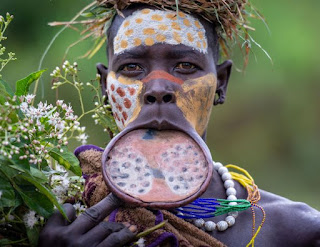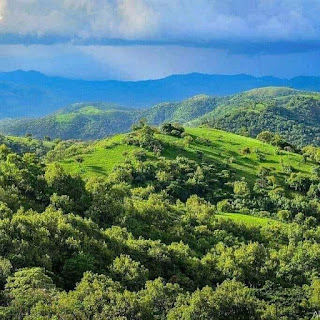Meet This Remote Tribe Women Who Wear Large Lip Plate To Determine Their Worth In Cows (Pictures)
A tribe in Africa gets budding brides to wear large lip plates to determine how much cattle they are worth. Suri tribeswomen, native to Ethiopia, sport lip plates up to 10 inches wide.
Tori Bohn, 56, from Bali, Indonesia, captured these stunning images in Kibish, in the southwest of the African country.
Another of her pictures sees an elder female of the tribe wearing a headdress of corn and displayed how her oversized and stretched lip appeared with the plate removed, hanging down below her chin.
Kibish is located in the Omo Valley, a region that is home to eight tribes with a total population of roughly 200,000.
Tori, who spent three days with the Suri tribe learning about their decorative lip plates, said: "I couldn't take my eyes off the first woman who approached me wearing a large lip plate.
"In person, it creates an even greater impression. It's a practice I wanted to learn more about.
"The girls make a slice in their lower lip during puberty and remove two of their lower teeth so later in life, they don't hit against the lip plate.
"They then use a system of ever-increasing sizes of fired clay plates to stretch the lip to extraordinary sizes. They told me that some of the largest plates measured sixteen inches.
"To the Suri, the lip plates represent beauty. The larger the plate, the more cattle negotiated for wedding dowries although it seemed the percentage of women choosing to wear a lip plate was getting smaller.
"Some of the young women we spoke to who chose to have a lip plate said they didn't like the difficulty of eating or drooling with the elongated lips.
"Most though had elongated ear lobes instead and wore large clay disks there.
"The women were quite accommodating in showing us how they put their lip plates in and take them out. "They had a great sense of humour and we had a good laugh together."
Business owner Tori took three days to reach the remote tribe.
There are thought to be around 7,500 Suri tribespeople left and their economy is centred around the tribe's cattle. Tori said: "You must get permits to visit and take all your own tents, food, and water.
"We had to hire an armed guard to accompany us throughout our three-day stay. The Suri people were excited to see us as visitors were somewhat rare.
"Several large sugar plantation factories are being built along the Omo River, which supports this tribe, and many fear this will cause the Suri - and other tribes - to abandon their traditions in exchange for factory work.
"A bridge across the Omo could bring more groups into this quieter part of the valley. We need to protect these cultures."
Earlier in 2021, the Daily Star told how men in the Suri tribe batter each other with sticks in a "masculinity contest" to win the hand of a bride.
Spanish photographer Xavier Gil Tabios, 62, witnessed the outlawed "Donga" contests while staying with the Suri people for seven days.
He said: "They fight to demonstrate masculinity, for personal revenge, and to win a wife.
"The participants fight two by two until one winner emerges from the tournament."










Comments
Post a Comment